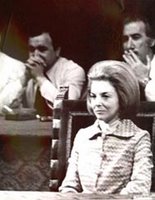Feminist Progress vs. Political Conservatism
 "Because Chile's primary wealth is not its copper, its fruit or wood, but its people. This richness represented by ingenuity, desires, dreams, is what I want to see grow. I believe that all Chilean's are capable of more. More ideas, work, strength, and richness."
"Because Chile's primary wealth is not its copper, its fruit or wood, but its people. This richness represented by ingenuity, desires, dreams, is what I want to see grow. I believe that all Chilean's are capable of more. More ideas, work, strength, and richness."
-Michele Bachelet
Chile has a history of political controversy and 2006 will prove no different. With the election of Michelle Bachelet as the first female presdient in Chile's history, debate has errupted ranging not just on the topic of her gender but on its political significance. I first want to discuss what I've heard many people say: Isn't great that a women was elected president?
So, if you are a Democrat, would you choose Condolezza Rice over a male Democratic Party candidate? But that topic I don't really want to discuss.
First, I began by doing some research and was surprised to find out that from 1900-2000 there were 46 females heads of state with the position of either presdient or prime minister. From 2001-2006 there has been 5, making it a total of 51 from 1900 to date. A women head of state has been in power in every continent.
Some of the most notable women include: 1. Margaret Thatcher, Prime Minister of United Kingdom (1979-1990) Resume: Also known as "Iron Lady" and as longest serving Prime Minister in UK history. When she entered the political arena, she quickly went up the ranks of the Tory Party because of her quick mouth and toughness. As PM she lead the privatization of coal mines and British Airways. Beat the National Union of Mineworkers in major labor battle from 1984-85. She also lead the Malvinas War (Faulkland Wars) in 1982 which ended with the slaughter of 3 times as many Argentine soldiers.
1. Margaret Thatcher, Prime Minister of United Kingdom (1979-1990) Resume: Also known as "Iron Lady" and as longest serving Prime Minister in UK history. When she entered the political arena, she quickly went up the ranks of the Tory Party because of her quick mouth and toughness. As PM she lead the privatization of coal mines and British Airways. Beat the National Union of Mineworkers in major labor battle from 1984-85. She also lead the Malvinas War (Faulkland Wars) in 1982 which ended with the slaughter of 3 times as many Argentine soldiers. 2. Isabel Peron, President of Argentina (1974-76) Resume: Third wife to well known Argenine military official and president, Juan Peron. His second wife, Evita, is much more known. But Isabel was his Vice-Presidential running mate, and when he passed soon after his election in 1973, she took the post. This was a time of which working-class struggles entered Argentina into a pre-revolutionary period. There were hopes by the capitalist class that Juan Peron could calm the situation. Isabel sent troops to repress the labor struggles, but was not able to squash them. She was ousted in a 1976 military coup that eventually lead to the death and disapearance of thousands of revolutionary youth.
2. Isabel Peron, President of Argentina (1974-76) Resume: Third wife to well known Argenine military official and president, Juan Peron. His second wife, Evita, is much more known. But Isabel was his Vice-Presidential running mate, and when he passed soon after his election in 1973, she took the post. This was a time of which working-class struggles entered Argentina into a pre-revolutionary period. There were hopes by the capitalist class that Juan Peron could calm the situation. Isabel sent troops to repress the labor struggles, but was not able to squash them. She was ousted in a 1976 military coup that eventually lead to the death and disapearance of thousands of revolutionary youth. 3. Indira Gandhi, Prime Minister of India (1966-77, 1980-84) Resume: She was not related to Mahatma Gandhi, but took part in the Independence Movement. She came from a wealthy family and attended college in England. Her father was a known politician that helped her garin respect. As PM, she lead India to become the youngest neclear powerr in 1974 as well as taking part of what is known as the Green Revolution that allowed India for the first time to produce surplus food for export. She was assasinated during her second term in 1984 and remains a controversial figure in India.
3. Indira Gandhi, Prime Minister of India (1966-77, 1980-84) Resume: She was not related to Mahatma Gandhi, but took part in the Independence Movement. She came from a wealthy family and attended college in England. Her father was a known politician that helped her garin respect. As PM, she lead India to become the youngest neclear powerr in 1974 as well as taking part of what is known as the Green Revolution that allowed India for the first time to produce surplus food for export. She was assasinated during her second term in 1984 and remains a controversial figure in India.
Putting your political opinions aside, these three women proved to carry out what they promised and were sent to do. They proved themselves as capable, and some more, than their male counterparts.
The election of Bachelet is significant for several reasons. Ms. Bachelet represents a part of Chile's history that is deeply controversial. She's a long time member of the Socialist Party and was active during the Salvador Allende presdiential years. She, as well as her parents, were arrested during the military dictatorship that took power September 11, 1973 led by four Generals but the most known being Augusto Pinochet. During her presidential campaign, Bachelet's political past was well known, making it an important turning point in Chilean politics. It was not just her past, but recognizing the brutality done under the dictatorship, since the stance by most politicians has been "lets put the past behind". It is the hope of many Chileans that the prosecution of the criminals from the years of military rule will now be expidited. There is no more "let's ignore what happened", but what is being discussed and demanded by many is JUSTICE.
Also, there's a false notion that Chile is very Catholic and sexist nation since it was the last country in the Americas to legalize divorce in May 2004. The result over the last decade was that 40 percent of children in Chile were born from unmarried couples--not very Catholic.
Will we see change? Will Pinochet finally serve time in jail as well as all the other criminals? Will Bachelet help the poor and strengthen the rights of working people? Will it be a big turning point? I want to know what you think. I'll follow this closely as well as I hope you will.
For further info on----
Malvinas War visit:
http://malvinas-argentina's.8m.com/
Women heads of state 20th Century:
http://womenshistory.about.com/od/rulers20th/a/women_heads.htm




